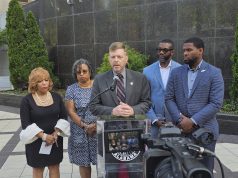
Times staff report
The U.S. Census Bureau has informed the state of Alabama that it plans to officially end the 2020 Census nationwide on Oct. 31.
Originally, Monday, Oct. 5 was the deadline to complete the census questionnaire. It takes about 10 minutes to complete the 2020 Census on either your phone or laptop. That lets you have an influence over what happens to the state in the next 10 years.
During the extension, the Census Bureau’s field workers, including door-to-door census takers, will continue their work to follow up with households who haven’t yet responded.
“The Census Bureau informed Alabama that it has made the decision to ultimately extend the census to October 31,” ADECA director and Alabama Counts! chairman Kenneth Boswell said. “This gives the state of Alabama an extended time to complete their census and make Alabama count.”
All Alabamians who have not already participated in the 2020 census can do so by self-responding online at www.my2020census.gov, by phone toll-free 844-330-2020, by returning the mailed paper form or by giving household’s information to a socially distanced door-to-door census taker. Any information given in the 2020 Census is protected by strict federal law.
State leaders are hoping to see the overall participation rate among Alabama households continue to rise with the extended time.
“This extra time will make a difference as Alabama households have more time to be counted” added Boswell. “It takes a matter of minutes to determine the future of our state, let’s use this time to cement our tally and influence all that depends on this final count.”
ADECA and Alabama Counts will continue to stay in contact with the U.S. Census Bureau and will provide any further updates as they are received.
Census data is used to allocate the 435 congressional seats, and Alabama is at risk of losing one of its seven congressional districts if residents do not comply. Alabama’s Census count will help determine the state’s share of federal aid, and those federal dollars are crucial to the economic health of Alabama.
The University of Alabama at Birmingham’s Peter Jones, Ph.D., assistant professor in the College of Arts and Sciences’ Department of Political Science and Public Administration says more than one-third of Alabama’s state budget is funded with transfers from the federal government.
“In 2017, Alabama received over $10 billion in federal aid,” Jones said. “Alabama is also one of the most federally dependent states, meaning Alabamians pay far less in federal taxes per capita than they receive in federal aid per capita.”
The goal is always to count everyone, but time and cost constrain how many follow-ups the Census can do.
Jones says, if Alabama does not have a good response rate, then it will likely be undercounted, which means it will likely lose a seat in Congress and might lose federal funding.
“In the recent Census counts, Black and Hispanic residents were especially susceptible to being undercounted, so an undercount may undermine efforts to address racial injustices as well,” Jones said.
For more information on the 2020 Census in Alabama, please visit https://alabama2020census.com.




